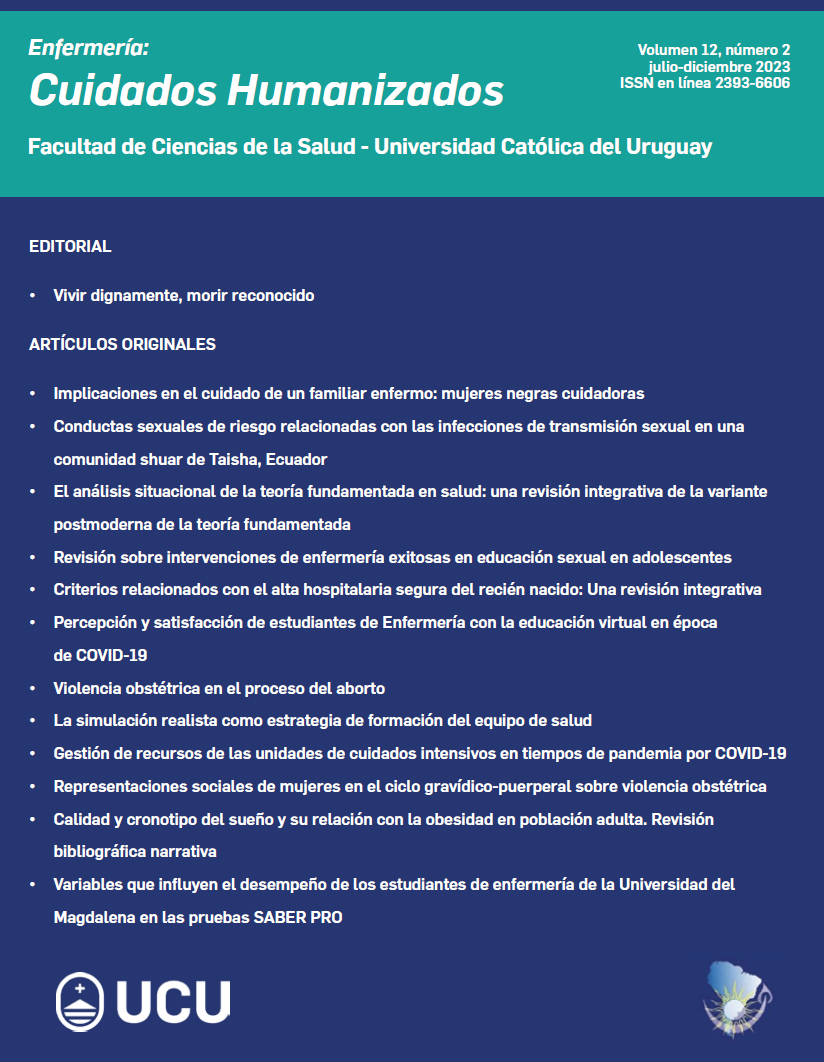Sleep Quality and Chronotype and its Relationship with Obesity in the Adult Population. Narrative Bibliographic Review
DOI:
https://doi.org/10.22235/ech.v12i2.3213Keywords:
sleep, obesity, chronotype, energy metabolism, reviewAbstract
Introduction: As a result of the high prevalence of obesity worldwide and nationally, and because of the incidence of this disease in the development of comorbidities, studying the factors that contribute to its development is necessary. The lack or disrupted sleep that is affecting our civilization, has been associated with the worldwide epidemic of obesity, being a modifiable factor to include in its therapy. Objective: To find recent evidence about the underlying mechanisms that build a possible relationship between sleep duration and/or quality with the development of obesity in adults. Methods: The search of articles was carried out by using virtual platforms of bibliographic databases, which were filtered by: age (18 to 64 years), human studies, full text, English and Spanish language and publications no longer than 5 years. Studies that evaluated sleep quality had to apply the Pittsburgh Sleep Quality Index (PSQI) and those that evaluated chronotype had to use the Horne and Ostberg’s Morningness - Eveningness Questionnaire or the Munich Chronotype Questionnaire. Results: Individuals with insufficient sleep duration and/or quality were more likely to become obese. Underlying mechanisms found were hormonal and metabolic alterations and an increase in food intake, mainly during the biological night. Conclusions: According to the selected bibliography, there is scientific evidence linking sleep duration and/or quality with the possible development of obesity in adults.
Downloads
References
Ceballos JJ, Pérez R, Flores J, Vargas J, Ortega G, Madriz R, et al. Obesidad. Pandemia del siglo XXI. Rev Sanid Milit [Internet]. 2018 [citado 2022 feb 17];72(5-6):332-338. Disponible en: http://www.scielo.org.mx/scielo.php?script=sci_arttext&pid=S0301-696X2018000400332&lng=es&nrm=iso&tlng=es
Organización Mundial de la Salud. Obesidad y sobrepeso [Internet]. 2021 [citado 2022 feb 17]. Disponible en: https://www.who.int/es/news-room/fact-sheets/detail/obesity-and-overweight
Ministerio de Salud Pública. 2da Encuesta Nacional de Factores de Riesgo de Enfermedades No Transmisibles [Internet]. Montevideo; 2018 [citado 2021 nov 20]. Disponible en: https://www.gub.uy/ministerio-salud-publica/comunicacion/publicaciones/2da-encuesta-nacional-de-factores-de-riesgo-de-enfermedades-no
Ministerio de Salud Pública. Sobrepeso y obesidad [Internet]. Montevideo; 2019 [citado 2021 nov 20]. Disponible en: https://www.gub.uy/ministerio-salud-publica/comunicacion/noticias/sobrepeso-y-obesidad
FAO, FIDA, OPS, WFP, UNICEF. Panorama de la Seguridad Alimentaria y la Nutrición en América Latina y el Caribe [Internet]. 2021 [citado 2022 feb 17]. doi: 10.4060/cb7497es
Chamorro R, Farías R, Peirano P. Circadian rhythms, eating patterns, and sleep: A focus on obesity. Rev Chil Nutr. 2018;45(3):285-92. doi: 10.4067/s0717-75182018000400285
Sleep Foundation. How Sleep Works: Understanding the Science of Sleep [Internet]. 2022 [citado 2022 feb 17]. Disponible en: https://www.sleepfoundation.org/how-sleep-works
Sleep Foundation. How Much Sleep Do We Really Need? [Internet]. 2022 [citado 2022 feb 17]. Disponible en: https://www.sleepfoundation.org/how-sleep-works/how-much-sleep-do-we-really-need
National Center for Chronic Disease Prevention and Health Promotion. Data and Statistics [Internet]. CDC; 2022 [citado 2022 may 30]. Disponible en: https://www.cdc.gov/sleep/data_statistics.html
American Sleep Association. Sleep Statistics: Data About Sleep Disorders [Internet]. 2022 [citado 2022 may 30]. Disponible en: https://www.sleepassociation.org/about-sleep/sleep-statistics/
Pot GK. Sleep and dietary habits in the urban environment: The role of chrono-nutrition. Proc Nutr Soc [Internet]. 2018 [citado 2022 may 30];77(3):189-198. doi: 10.1017/S0029665117003974
Koren D, Taveras EM. Association of sleep disturbances with obesity, insulin resistance and the metabolic syndrome. Metabolism [Internet]. 2018 [citado 2022 may 30];84:67-75. doi: 10.1016/j.metabol.2018.04.001
Sleep Foundation. What Is Circadian Rhythm? [Internet]. 2022 [citado 2022 feb 17]. Disponible en: https://www.sleepfoundation.org/circadian-rhythm
Ministerio de Salud Pública. Nutrición, Alimentación y Actividad Física para la prevención de enfermedades No Transmisibles [Internet]. Montevideo; 2017 [citado 2022 may 30]. Disponible en: https://www.gub.uy/ministerio-salud-publica/comunicacion/publicaciones/nutricion-alimentacion-actividad-fisica-para-prevencion-enfermedades
Victoria M, Posadas L, Valenti L. Guía de Práctica Clínica Nacional Sobre Diagnóstico y Tratamiento de la Obesidad [Internet]. Buenos Aires; 2017 [citado 2022 abr 12]. Disponible en: http://www.msal.gob.ar/images/stories/bes/graficos/0000000302cnt-2013-11_gpc_obesidad-2013.pdf
Organización Mundial de la Salud. Estadísticas sanitarias Mundiales. Una instantánea de la salud mundial [Internet]. 2012 [citado 2022 abr 12]. Disponible en: http://apps.who.int/iris/handle/10665/70887
Noh J. The Effect of Circadian and Sleep Disruptions on Obesity Risk. J Obes Metab Syndr [Internet]. 2018 [citado 2022 abr 11];27(2):78-83. Disponible en: https://www.jomes.org/journal/view.html?doi=10.7570/jomes.2018.27.2.78
Cooper CB, Neufeld EV, Dolezal BA, Martin JL. Sleep deprivation and obesity in adults: A brief narrative review. BMJ Open Sport Exerc Med. 2018;4(1): e000392. doi: 10.1136/bmjsem-2018-000392
Pilz LK, Levandovski R, Oliveira MAB, Hidalgo MP, Roenneberg T. Sleep and light exposure across different levels of urbanisation in Brazilian communities. Sci Rep [Internet]. 2018 [citado 2022 abr 26];8(1):11389. doi: 10.1038/s41598-018-29494-4
Kolovos S, Jimenez-Moreno AC, Pinedo-Villanueva R, Cassidy S, Zavala GA. Association of sleep, screen time and physical activity with overweight and obesity in Mexico. Eat Weight Disord [Internet]. 2021 [citado 2022 abr 26];26(1):169-79. doi: 10.1007/s40519-019-00841-2
Almojali AI, Almalki SA, Alothman AS, Masuadi EM, Alaqeel MK. The prevalence and association of stress with sleep quality among medical students. J Epidemiol Glob Health [Internet]. 2017 [citado 2022 abr 29];7(3):169-74. doi: 10.1016/j.jegh.2017.04.005
Bodur M, Baspinar B, Özçelik AÖ. A cross-sectional evaluation of the relationship between social jetlag and diet quality. Chronobiol Int [Internet]. 2021 [citado 2022 may 13];38(11):1557-1568. doi: 10.1080/07420528.2021.1935990
Xiao Q, Garaulet M, Scheer FAJL. Meal timing and obesity: interactions with macronutrient intake and chronotype. Int J Obes [Internet]. 2019 [citado 2022 abr 29];43(9):1701-1711. doi: 10.1038/s41366-018-0284-x
Maukonen M, Kanerva N, Partonen T, Kronholm E, Tapanainen H, Kontto J, et al. Chronotype differences in timing of energy and macronutrient intakes: A population-based study in adults. Obesity (Silver Spring) [Internet]. 2017 [citado 2022 abr 1];25(3):608-615. doi: 10.1002/oby.21747
Maukonen M, Kanerva N, Partonen T, Männistö S. Chronotype and energy intake timing in relation to changes in anthropometrics: a 7-year follow-up study in adults. Chronobiol Int [Internet]. 2019 [citado 2022 ene 31];36(1):27-41. doi: 10.1080/07420528.2018.1515772
Qian J, Morris CJ, Caputo R, Garaulet M, Scheer FA. Ghrelin is Impacted by the Endogenous Circadian System and by Circadian Misalignment in Humans. Int J Obes (Lond) [Internet]. 2019 [citado 2022 abr 21]; 43(8):1644-1649. doi: 10.1038/s41366-018-0208-9
Leung GKW, Huggins CE, Bonham MP. Effect of meal timing on postprandial glucose responses to a low glycemic index meal: A crossover trial in healthy volunteers. Clin Nutr [Internet]. 2019 [citado 2022 may 20];38(1):465-71. doi: 10.1016/j.clnu.2017.11.010
Leung GKW, Huggins CE, Ware RS, Bonham MP. Time of day difference in postprandial glucose and insulin responses: Systematic review and meta-analysis of acute postprandial studies. Chronobiol Int [Internet]. 2020 [citado 2022 may 19];37(3):311-26. doi: 10.1080/07420528.2019.1683856
Hashemipour S, Ghorbani A, Khashayar A, Olfati H. Association of sleep quality with insulin resistance in obese or overweight subjects. Sleep Sci. 2021;14(Special 1):75-8. doi: 10.5935/1984-0063.20200084
Ha K, Song Y. Associations of Meal Timing and Frequency with Obesity and Metabolic Syndrome among Korean Adults. Nutrients [Internet]. 2019 [citado 2022 abr 29];11(10):2437. doi: 10.3390/nu11102437.
Gu C, Brereton N, Schweitzer A, Cotter M, Duan D, Børsheim E, et al. Metabolic Effects of Late Dinner in Healthy Volunteers-A Randomized Crossover Clinical Trial. J Clin Endocrinol Metab [Internet]. 2020 [citado 2022 may 13];105(8):2789-2802. doi: 10.1210/clinem/dgaa354
McHill AW, Phillips AJK, Czeisler CA, Keating L, Yee K, Barger LK, et al. Later circadian timing of food intake is associated with increased body fat. Am J Clin Nutr [Internet]. 2017 [citado 2022 may 24];106(5):1213-1219. doi: 10.3945/ajcn.117.161588
Tavakoli A, Mirzababaei A, Mirzaei K. Association between low carbohydrate diet (LCD) and sleep quality by mediating role of inflammatory factors in women with overweight and obesity: A cross-sectional study. Food Sci Nutr. 2021 [2022 may 3];9(11):6252-6261. doi: 10.1002/fsn3.2584
Hudson JL, Zhou J, Campbell WW. Adults Who Are Overweight or Obese and Consuming an Energy-Restricted Healthy US-Style Eating Pattern at Either the Recommended or a Higher Protein Quantity Perceive a Shift from «Poor» to «Good» Sleep: A Randomized Controlled Trial. J Nutr [Internet]. 2020 [2022 may 9];150(12):3216-3223. doi: 10.1093/jn/nxaa302
Muscogiuri G, Barrea L, Aprano S, Framondi L, Di Matteo R, Laudisio D, et al. Sleep Quality in Obesity: Does Adherence to the Mediterranean Diet Matter? Nutrients [Internet]. 2020 [citado 2022 feb 6];12(5): 1364. doi: 10.3390/nu12051364
Godos J, Ferri R, Caraci F, Cosentino FII, Castellano S, Galvano F, et al. Adherence to the Mediterranean Diet is Associated with Better Sleep Quality in Italian Adults. Nutrients [Internet]. 2019 [citado 2022 may 21];11(5):976. doi: 10.3390/nu11050976
Park SK, Jung JY, Oh CM, McIntyre RS, Lee JH. Association Between Sleep Duration, Quality and Body Mass Index in the Korean Population. J Clin Sleep Med [Internet]. 2018 [citado 2022 feb 6];14(8):1353-1360. 1353-1360. doi: 10.5664/jcsm.7272
Sweatt SK, Gower BA, Chieh AY, Liu Y, Li L. Sleep quality is differentially related to adiposity in adults. Psychoneuroendocrinology [Internet]. 2018;98:46-51. doi: 10.1016/j.psyneuen.2018.07.024
González A, López F, Valencia M, Espinosa Á. Partial sleep deprivation on dietary energy intake in healthy population: a systematic review and meta-analysis. Nutr Hosp [Internet]. 2020 [citado 2022 ene 27];37(5):1052-60. doi: 10.20960/nh.03108
Hur S, Oh B, Kim H, Kwon O. Associations of diet quality and sleep quality with obesity. Nutrients [Internet]. 2021 [citado 2022 ene 24];13(9):3181. doi: 10.3390/nu13093181
Vidafar P, Cain SW, Shechter A. Relationship between Sleep and Hedonic Appetite in Shift Workers. Nutrients [Internet]. 2020 [citado 2022 may 21];12(9):2835. doi: 10.3390/nu12092835
Herrera D, Ng C, Durán-Agüero S, Ríos-Castillo I. Patrón de sueño, estado nutricional e ingesta dietética en agentes de seguridad de la Ciudad de Panamá: un estudio transversal. Rev Española Nutr Humana y Dietética [Internet]. 2021 [citado 2022 feb 14];25(1):48-57. doi: 10.14306/renhyd.25.1.1062
Downloads
Published
How to Cite
Issue
Section
License
Copyright (c) 2023 Enfermería: Cuidados Humanizados

This work is licensed under a Creative Commons Attribution 4.0 International License.

















